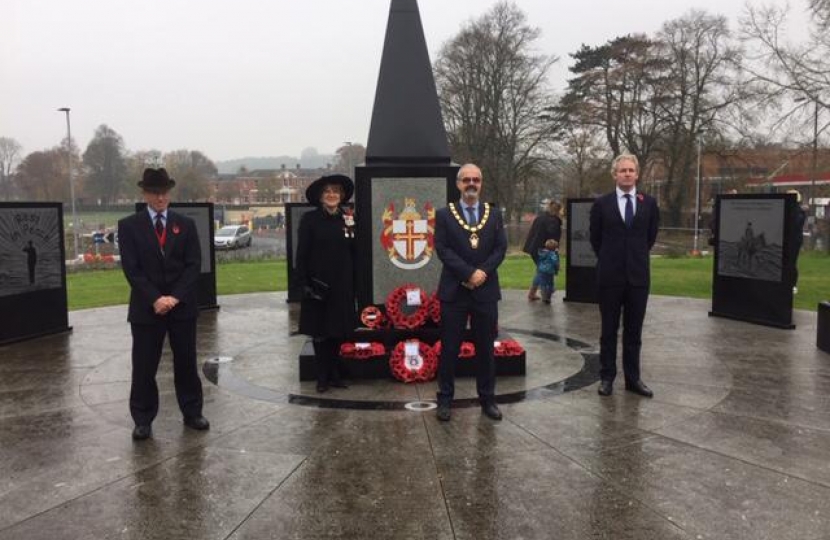
At Tidworth’s Remembrance Day ceremony a year ago a thousand people filled the grass around the memorial. Today perhaps two dozen people, in small family groups, distanced themselves around the field. I had the honour of laying a wreath alongside the Lord Lieutenant and the Mayor.
Tidworth is one of the principal homes of the British Army. The road names - Somme, Meerut - and the barracks - Candahar, Delhi, Lucknow - tell of our imperial and European history, but the beautiful memorial, built by public subscription in 2018, records all our modern wars. As I listened to the Last Post I thought of all the soldiers who went out from this corner of Wiltshire and never came home, or came home in coffins. Laurence Binyon’s poem, etched on the memorial, has it right: “To the innermost heart of their own land they are known”.
The occasion was quiet because of the restrictions introduced by the Government this week. I voted for them, along with almost all MPs from all parties, but not without a lot of regret and anxiety about whether we are doing the right thing. I have set out my thinking on lockdowns in general (rather than a more trusting approach that leaves people free to manage their own risk) in this article from a few weeks ago which is still relevant; and in this one from last weekend after the PM’s announcement.
Before my vote I held two public meetings online with constituents. The first was with business owners and very naturally there was significant concern about the impact of the lockdown on the local economy, and the need for a comprehensive support package for all businesses - including the self-employed and small company directors who missed out on the earlier support. The second meeting was more general and I had the opportunity to hear a wide range of views about the choices we face as a country.
On Friday I had a call with Wiltshire council and NHS chiefs to hear about the local impact of the pandemic. After a rapid rise in infections in early October there are some indications that transmission may be plateauing, though the number of cases continues to increase. At 92 cases per 100,000 we are half the English average, but the rate of new cases in older people is growing fast, and this is the great concern.
The track and trace system is, I am glad to say, becoming increasingly localised, with a new local tracing partnership being launched later this month. This will make more use of old-fashioned shoe-leather methods of tracking people who need to isolate when the national call centres can’t get hold of them.
We also had an update on the status of care homes, and the crucial question of family visits. There is no evidence of infections in Wiltshire care homes caused by visitors, and there are rules which care homes can use to make visits safe. I would like to hear from anyone who is not currently able to make or receive care home visits, and see whether I can help.
Two pieces of good news were announced this week, which confute some of the smears and suspicions the Government has been under. First, we moved to ensure British food standards are maintained, and British farmers protected, in any trade deals. Somehow, Defra ministers managed to satisfy both the NFU and the Department of Trade. I tweeted here an article by Liz Truss and George Eustice, the Trade and Defra Secretaries, which sets out the new policy well.
The second piece of good news was today’s announcement about food and activities in the holidays for children of families on low incomes. We came under intense pressure to repeat the supermarket voucher scheme introduced in the summer, and I’m glad we resisted, because today’s package is much better. I set out why here. I fully acknowledge the role played by the footballer Marcus Rashford and his army of supporters - including opposition politicians - in making the case for a generous package of measures. We were flat-footed in our initial response and this was an example of politics working, via the media and Parliament, to influence government to do a good thing.
A final sombre note. A Conservative colleague, Andrew Mitchell MP, wants to legalise assisted suicide for people with terminal conditions, and raised the issue in Parliament. This is part of a growing campaign for a change in the law (the last attempt to do so was in 2015). I respect the arguments Andrew and others make, but I am concerned that we are considering this question without its broader context, which is that medical science can both palliate the pain of death in almost all cases, and extend life artificially beyond its natural span. As I said in the debate (see my very brief comment here) we need a broader debate about death and dying than one purely focused on assisted suicide.





